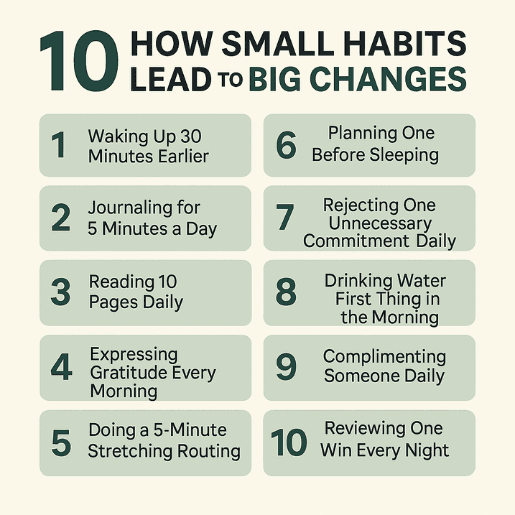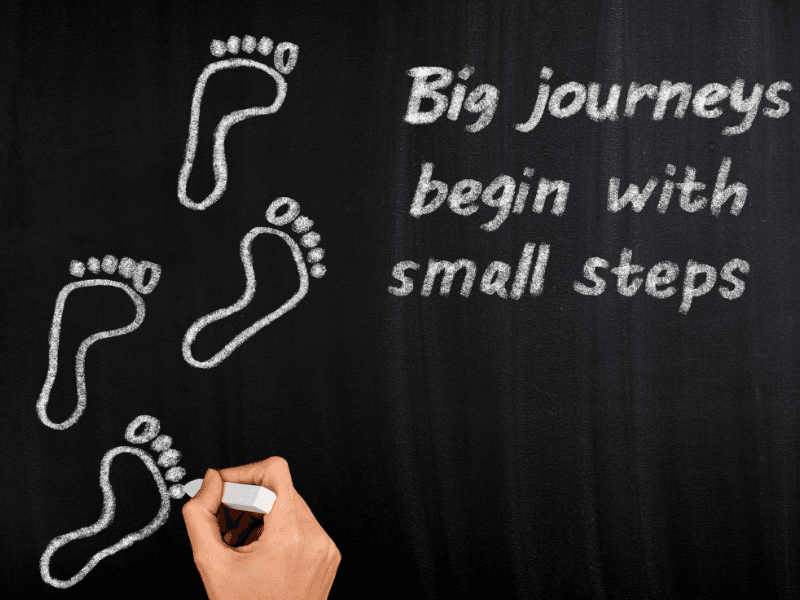“Small Habits leads to Big life changes start with small steps. Most successful people around the world are usually really into reading books”
Have you ever seen a successful person and wondered how they achieved so much in their career or business?
Most people believe life changes only happen with massive actions — quitting a job, moving to a new country, starting a million-dollar company overnight. But actually, the key to long-lasting transformation is far less flashy: minor habits.
Tiny, almost invisible actions that repeat day after day build a foundation for massive, visible results. It’s not glamorous, and it’s not instant, but it’s powerful beyond belief. If you master your small habits, you can redesign your entire life without waiting for “the right time” or needing giant breakthroughs.
In this blog, we’ll dive deep into how small habits lead to big changes, why they are more powerful than chasing big goals, the best small habits to start today, and how you can finally make them stick.
Why Small Habits Are More Powerful Than Big Goals
Big goals inspire us — they give us something to dream about. But they also have a sneaky side effect: they often paralyze us. When a goal seems too substantial, it burdens the mind. You lack direction, leading to procrastination. Small habits, conversely, are so minuscule that they seem irresistible to resist. It’s easier to write one paragraph than a whole book. It’s easier to do five minutes of exercise than run a marathon. Over time, these small actions compound.
Every positive choice you make today — even if it feels insignificant — becomes a building block for a much bigger future.
Think about your life as a bank account. Each small habit represents a deposit. Every small habit is a deposit. Ignore it once, and maybe nothing happens. But make those deposits every day, and soon you’ll have a fortune of skills, health, confidence, and happiness.
10 How Small Habits lead to Big Changes

1. Waking Up 30 Minutes Earlier
Imagine having 30 extra minutes every morning just for yourself. No rushing, no panic, just peaceful time to set the tone for your day. Waking up earlier can give you the space to meditate, stretch, journal, or simply enjoy a slow breakfast. It’s a small change, but it creates a ripple effect throughout your day. When you begin your day with a peaceful mindset, you become less reactive, more attentive, and better equipped to face obstacles.
Over time, this single habit can dramatically improve your productivity, mood, and resilience.
2. Journaling for 5 Minutes a Day
You don’t have to write a novel every morning. A brief 5-minute mind spill — your reflections, aspirations, challenges, concepts — can greatly enhance your mental acuity. Journaling helps you process emotions, track your goals, and spot patterns in your thinking that you might otherwise miss. Having a dialogue with oneself without any criticism is akin to conversing with your own thoughts.
Research shows that even short daily journaling can reduce stress, improve mood, and strengthen emotional intelligence. A small daily commitment could change how you see yourself and the world.
3. Reading 10 Pages Daily
It might not sound like much, but reading just 10 pages a day adds up fast. In one year, you could easily finish 15–20 books — books that could change your mindset, upgrade your skills, or expand your vision of what’s possible. The majority of accomplished individuals worldwide are typically avid readers. They know that one idea, one perspective, one new piece of knowledge can unlock massive opportunities. Ten pages is small enough that you’ll never feel overwhelmed, but big enough to transform your thinking over time.
4. Expressing Gratitude Every Morning
Pause before grabbing your phone or delving into your tasks. Please spare a moment to write down three things you are grateful for. It can be as simple as “I’m grateful for my morning coffee, my cozy bed, and the Today brings sunlight. Gratitude shifts your brain’s focus to abundance rather than scarcity.
Numerous studies have shown that practicing daily gratitude improves mental health, strengthens relationships, boosts resilience, and even improves sleep. Over time, you’ll naturally start noticing more good things, which leads to greater happiness and motivation.
5. Doing a 5-Minute Stretching Routine
Sitting hunched over a desk all day? Your body is pleading with you to get moving.
A simple five-minute stretching routine in the morning or evening can improve your posture, reduce muscle tension, increase blood flow, and boost your energy. You don’t need fancy yoga classes. Basic neck circles, hamstring stretches, and shoulder stretches are sufficient.
Plus, regular stretching increases body awareness — a critical but often overlooked part of overall wellness. Healthy body, healthier mind.
6. Planning Tomorrow Before Sleeping
Spending just five minutes at night planning your next day can save you hours of wasted energy tomorrow. When you wake up already knowing what’s important, you reduce decision fatigue and stay focused. It can be as simple as writing your top 3 tasks or setting priorities for work, health, and relationships. Having a mini-plan gives your subconscious mind a blueprint to work with overnight, making you more efficient, creative, and calm. .
7. Rejecting One Unnecessary Commitment Daily.
Every automatic “yes” you give diminishes your time and energy. Learning to politely but firmly decline unnecessary requests is a potent, small practice. It creates room for what truly holds value. Each time you turn down a needless meeting, an unenjoyable commitment, or a goal-unaligned project, you take back control of your life. Refusing is not selfish; it is strategic. It signifies reverence for your aspirations and priorities.
8. Drinking Water First Thing in the Morning
Before reaching for coffee or tea, start your day with a full glass of water. During the night, your body can become dehydrated, so rehydrating first thing in the morning helps awaken your brain and jumpstart your metabolism. This simple habit yields significant benefits: improved skin health, digestion, energy levels, and cognitive function. Place a glass of water on your bedside table tonight to make it easy to remember in the morning.
9. Complimenting Someone Daily
It takes just 10 seconds to genuinely compliment someone, but it can completely change their day — and yours. Complimenting builds positive relationships, boosts your emotional intelligence, and trains your brain to notice the good in others. Whether it’s praising a co-worker’s effort, a friend’s creativity, or a stranger’s kindness, these small acts ripple outward. Over time, you’ll attract more positivity into your own life too.
10. Reviewing One Win Every Night
Before you go to bed, reflect on one positive thing you accomplished today — regardless of its size. Perhaps you handled a difficult conversation calmly. Maybe you opted for a nutritious meal. Even simply getting out of bed when you were feeling unmotivated counts. Recognizing even the tiniest victories helps foster self-belief and assurance. Remember, achieving success doesn’t mean never encountering setbacks; it means persistently advancing, one step at a time.
How to Build Small Habits That Actually Stick

Starting a habit is easy. Sticking to it is the real challenge. The secret is making the habit so small you can’t fail. Want to start reading daily? Just aim for one page. Want to meditate? Start with one minute. This is called the two-minute rule — make the first action so tiny that momentum naturally carries you forward.
Another effective technique is habit stacking: link a new habit to an existing one. For instance, following your teeth brushing routine, spend 2 minutes journaling. After making coffee, make a note of three things you appreciate. Remember, consistency is key, not perfection. Missing a day doesn’t equate to failure. What truly counts is resuming the habit the following day.
The Science Behind Small Habit Success

Science confirms what experience shows: small habits create a significant cumulative impact. According to James Clear, the author of Atomic Habits, habits are like the “compound interest of self-improvement.” Just as money grows through small deposits over time, tiny positive actions lead to substantial results when maintained.
Research in neuroscience also shows that repetition strengthens neural pathways. Every time you repeat a behaviour, you reinforce the brain’s wiring — making that action more automatic over time.
One study published in the European Journal of Social Psychology found that, on average, it takes about 66 days to form a new habit — not 21 days, as many myths suggest. So patience, not speed, wins the game.
(Reference: Harvard Business Review – How Habits Make or Break Your Success)
Big dreams are beautiful, but they’re built on the invisible bricks of daily action. Your life tomorrow is being shaped by the small habits you practice today.
You can start by making small, consistent, intentional changes in your life, instead of trying to completely overhaul everything all at once.
Pick one small habit from this list and commit to it for the next seven days. Watch how that one change gently tugs other parts of your life toward growth and greatness. Because at the end of the day, it’s the little things that become the big things.
“What small habit are you looking forward to beginning today? Share it in the comments below to motivate someone else to take their initial small, yet impactful, step!”

